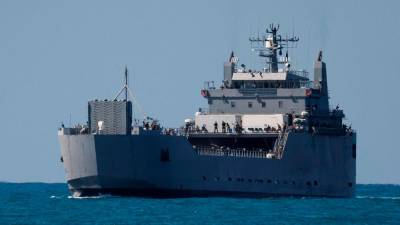ISRAELI forces have intercepted boats carrying aid bound for Gaza, in the latest attempt by foreign activists to break an Israeli blockade and deliver supplies to the Palestinian territory.
Below is an outline of the legal implications for the 500 parliamentarians, lawyers and activists onboard more than 40 civilian boats that made up the flotilla.
What happened in previous attempts?
As with previous attempts to breach the blockade, the detained activists are being taken to Israel where they will face deportation, according to Israel’s foreign ministry. Some of those on the latest flotilla, including Swedish climate campaigner Greta Thunberg, have been previously detained by Israeli authorities as they attempted to break the blockade .
In the past, activists detained by Israel were not criminally prosecuted and instead their presence was treated as an immigration matter. When Thunberg’s previous flotilla was intercepted in June, she and three other activists signed deportation orders waiving the right to delay their removal for a period of 72 hours so they could appeal and were immediately ejected from the country. Eight other activists, among them French nationals including Rima Hassan, a French member of the European parliament who is participating in the latest flotilla, refused to sign the orders on the grounds that they had never intended to enter Israeli territory but were forcibly taken to Israel by the authorities. They were detained near Tel Aviv airport – Hassan was held briefly in solitary confinement, an NGO representing her said – and appeared before a tribunal which upheld their deportation orders and ordered their removal. All those deported were banned from returning to Israel for 100 years, legal representatives said.
Identification and processing before deportation
Adalah, a human rights organisation and legal centre in Israel, has represented aid flotilla participants who were detained by Israel. Suhad Bishara, the organisation’s legal director, told Reuters on Thursday that her team was awaiting the arrival of those detained overnight in the port of Ashdod, 40 km (25 miles) north of the Gaza Strip.
She said once the flotilla crews arrived, they would be identified and transferred to the immigration authority to process them for anticipated deportation, before being moved into custody, likely in Ketziot Prison in southern Israel.
“Our main concern of this stage, of course, is their well-being, their health condition as well, making sure that they all get the legal advice prior to the hearings in the Immigration Tribunal and while (they are) in Israeli prison,“ she said.
Detainees to be held in high-security prison
Omer Shatz, an Israeli international law expert at Paris’ Sciences Po University in Paris, said unlike where flotilla activists were held last time, Ketziot was a high-security prison that did not normally hold immigration detainees.
He said the activists may be held there because processing 500 people would be logistically difficult for Israel. Shatz, however, described Ketziot Prison as being known for its harsh conditions.
Questions over repeat offenders
Adalah said in an earlier statement about the legal process that although Israeli authorities would have a record of repeat participants in aid flotillas, activists such as Thunberg and Hassan, were generally treated in the same way as first-time participants, subject to short-term detention and deportation.
It added however that there had been recent proposals by Israeli officials, among them National Security Minister Itamar Ben-Gvir that flotilla participants be subjected to prolonged detention.
“There are serious concerns that activists may be treated more harshly than in previous flotilla missions,“ the organisation said.
A spokesperson for Israel’s foreign ministry did not immediately respond to Reuters questions on the detention of the activists.
Israel’s foreign ministry said that the flotilla was warned by the navy that it was approaching an active combat zone and violating a “lawful naval blockade”, and asked organisers to change course. It offered to transfer the aid to Gaza, the foreign ministry said – REUTERS
